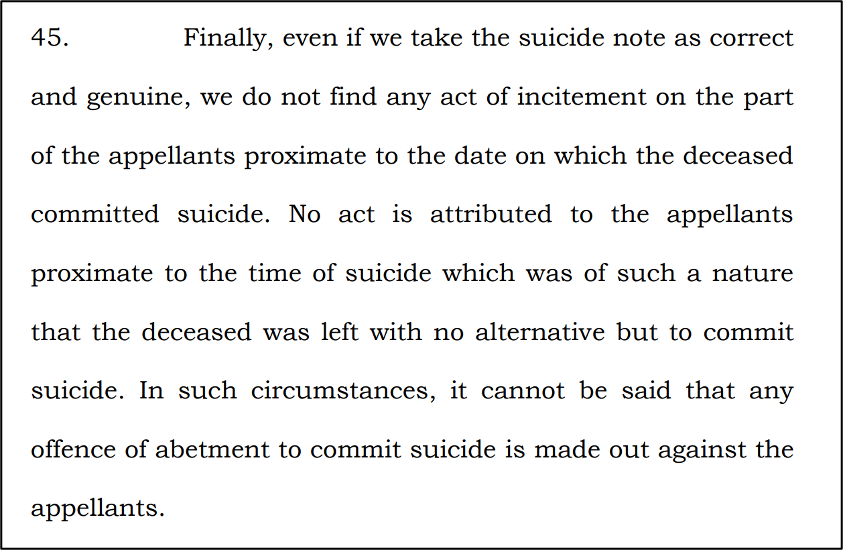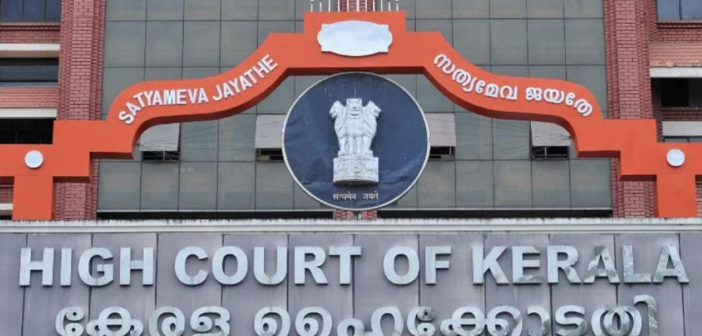In this edition of the court judgments review, we look at the Supreme Court’s order stating that the state has an obligation to ensure adequate facilities for breastfeeding mothers under Article 21, that a suicide note alone is insufficient to prove abetment in the absence of concrete evidence, Kerala HC’s judgment that step-parent adoption requires the biological parents’ consent, among others.
SC: State has an obligation to ensure adequate facilities for breastfeeding mothers under Article 21
In Maatr Sparsh- An Initiative by Avyaan Foundation vs. Union of India & Others, the petitioner is a non-governmental organization (NGO). It filed a public interest litigation seeking the establishment of feeding rooms, childcare facilities, and crèches in public places to support nursing mothers and infants. The NGO highlighted the difficulties faced by mothers due to the lack of such facilities, emphasizing that breastfeeding is essential for a child’s health and well-being.
According to the petitioner, depriving mothers and children of safe and dignified spaces for breastfeeding infringes on their fundamental rights under Article 21 of the Indian Constitution. Given the increasing participation of women in public life and the workforce, the petitioner asserted that it is the State’s duty to provide adequate childcare infrastructure. The petitioner referred to a previous case before the Delhi High Court, where the Union of India had acknowledged the importance of such facilities but had not taken concrete action.
The Union of India submitted that it had already issued an advisory to all State Governments and Union Territories, emphasizing the need for gender-friendly spaces, including feeding rooms and childcare facilities in workplaces, public transport hubs, and other public places. The advisory highlighted the necessity of these measures for increasing women’s participation in the workforce and ensuring the well-being of infants.
The Supreme Court bench of Justices B V Nagarathna and P B Varale recognized the fundamental importance of breastfeeding for a child’s health and development, as well as a mother’s right to breastfeed in a dignified environment. It cited constitutional provisions such as Article 21, Article 39(f), and Article 47, which mandate the State to ensure children’s well-being and nutrition. Acknowledging that the advisory issued by the Central Government aligns with fundamental rights, the court directed the Union of India to issue a formal reminder to all State Governments and Union Territories, instructing them to implement the recommended measures. Additionally, it emphasized that public buildings under construction should incorporate dedicated spaces for childcare and breastfeeding. The writ petition was accordingly disposed of with these directions.
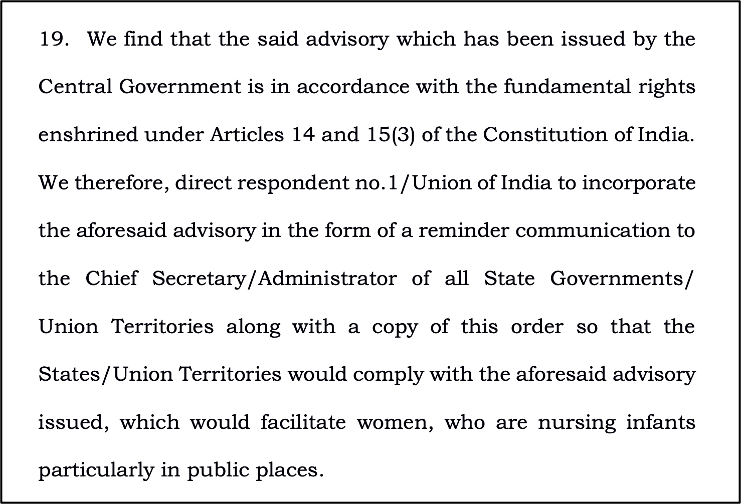
Kerala HC: Step-parent adoption requires the biological parents’ consent
The case, Ammu Ajit vs. Central Adoption Resource Agency, concerns a step-parent adoption where the first petitioner (mother) and the second petitioner (stepfather) sought to adopt the child from the mother’s previous marriage. The first petitioner had divorced the fifth respondent (biological father) through a mutual settlement, which granted her permanent custody of the child while allowing the father interim custody and visitation rights. However, the father had not visited or contacted the child since 2016, and the mother alleged that he had effectively disowned the child by claiming to have no children on a matrimonial website. She also argued that the father had a criminal background and posed a risk to the child’s welfare.
The petitioners applied for step-parent adoption through the State Adoption Resource Agency and the Child Welfare Committee. However, the biological father opposed the adoption, arguing that it was legally impermissible under both the Hindu Adoption and Maintenance Act and the Juvenile Justice Act. He contended that his consent was mandatory and that the mother had deliberately obstructed his attempts to maintain a relationship with the child.
The Kerala High Court’s Justice C S Dias observed that under the Juvenile Justice Act and the Adoption Regulations, step-parent adoption requires the biological parent’s consent unless the parent has surrendered the child. Since the father had custodial rights and had not consented, the adoption could not proceed. The Court also ruled that Regulation 63, which allows for procedural relaxations, could not be used to waive substantive rights like parental custody. It emphasized that adoption permanently severs the legal relationship between the child and the biological parent, making consent a crucial safeguard. Accordingly, the petitioners’ request was denied, and the writ petition was dismissed.
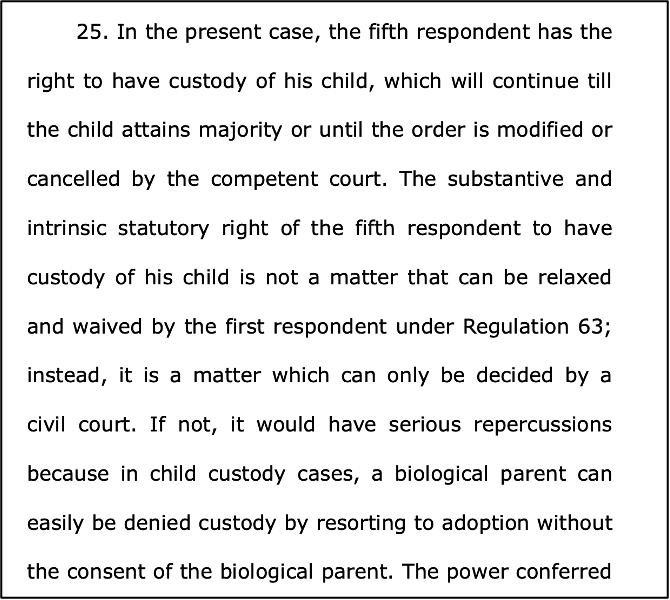
Madras HC: Insurance company must pay compensation even if driver was intoxicated
The case, Bhuvaneswari and others vs. M/s. Bvm Storage Solutions Pvt Ltd, is about an appeal filed under Section 173 of the Motor Vehicles Act, 1988, requesting a higher compensation amount for the family of Rajasekaran, who died in a road accident in December 2017. He was walking along Thiruneermalai Main Road when a van hit him. His dependents (the claimants) filed a case seeking Rs. 65 lakhs as compensation. The Motor Accident Claims Tribunal in Chennai awarded them Rs. 27.65 lakhs with 7.5% annual interest but ruled that the insurance company was not responsible for paying because the van driver was intoxicated. Instead, the vehicle owner was held liable.
The claimants challenged this decision, arguing that, based on previous court rulings, the insurance company should first pay the compensation and then recover the amount from the vehicle owner. The insurance company, however, supported the Tribunal’s decision, stating that they were not responsible since the driver violated the policy by driving under the influence of alcohol.
The Madras High Court’s Justice M Dhandapani referred to a 2023 Kerala High Court ruling (Muhammed Rashid vs. Girivasan E K), which followed Supreme Court and Andhra Pradesh High Court decisions. These rulings state that even if a driver was intoxicated, the insurance company must still pay the compensation first and can later recover it from the policyholder. Based on this, the court ruled that the insurer must pay the compensation and recover the amount from the vehicle owner.
The court also recalculated the compensation, enhancing it to Rs.30.25 lakhs. The insurance company was asked to deposit the amount within six weeks and recover it from the owner later. The appeal was partly allowed.
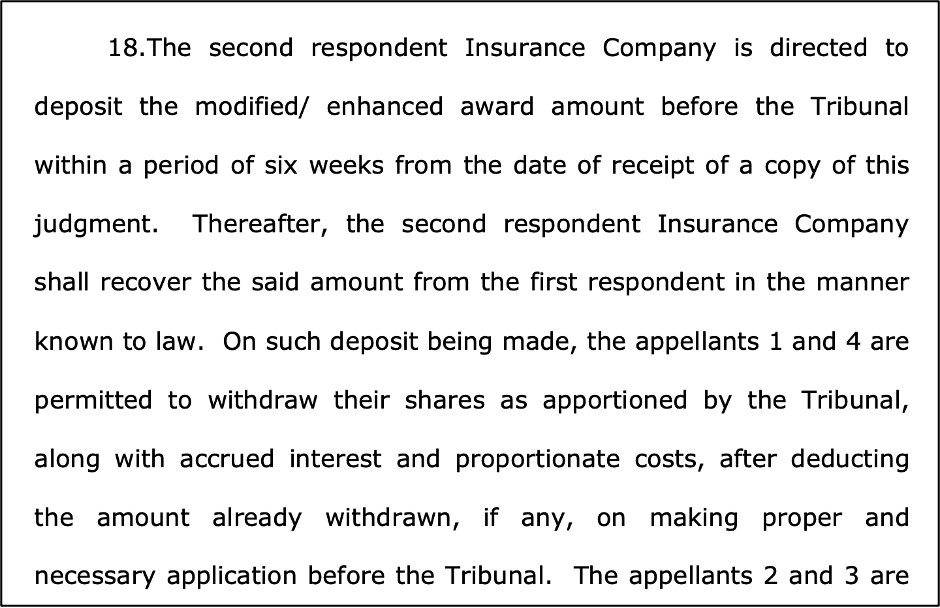
J&K HC: Confidentiality regarding victims of sexual offences should be maintained
The Jammu & Kashmir and Ladakh High Court, in the case of Fazil Saleem Bhat vs. Union Territory, emphasized the need to protect the identity of the prosecutrix (victim) in cases related to sexual offences. During the hearing of an appeal, the counsel for the Union Territory pointed out that certain pages of the appeal memo contained the name of the prosecutrix, which is against legal norms established to safeguard victims of sexual crimes. The revealed name appeared in documents forming part of the charge sheet, which had been translated and placed on record.
Justices Atul Sreedharan and Justice Puneet Gupta of the High Court agreed with the submission of the Union Territory’s counsel and directed the court office to immediately redact the prosecutrix’s name from specific pages of the appeal memo. Additionally, any other pages identified by the counsel containing the name were also to be redacted in both the physical and digital records.
The court further emphasized the importance of compliance with the Supreme Court’s ruling in Vipul Saxena & Others vs. Union of India & Others (2019). It directed the Union Territory of Jammu & Kashmir to sensitize all investigative agencies involved in investigating offences under Section 376 IPC and POCSO Act, including the police, forensic labs, and medical professionals, to ensure that the prosecutrix’s name is not disclosed in any official documents.
The matter was scheduled for the next hearing, after ensuring compliance with the redaction orders. The court also instructed that a copy of the order be served to the Registrar Judicial, Srinagar, for necessary implementation.
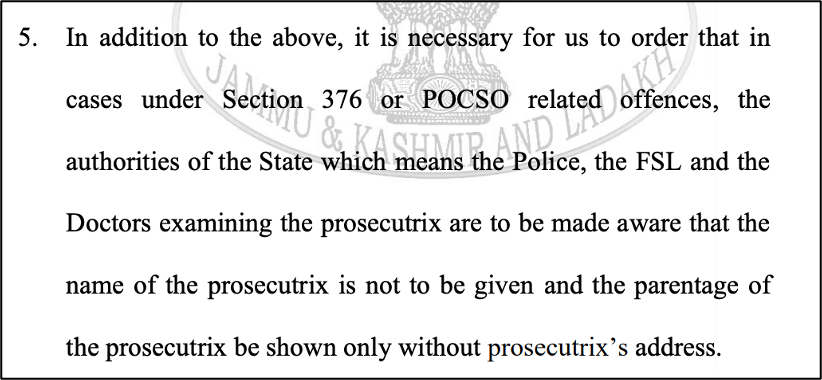
SC: Suicide note alone is insufficient to prove abetment in absence of concrete evidence
The case, Patel Babubhai Manohardas & Others vs. State Of Gujarat, involves the conviction of four appellants under Sections 306 and 114 of the Indian Penal Code (IPC) for abetment to commit suicide. The deceased, Dashrathbhai Karsanbhai Parmar, consumed poison and died in 2009. The prosecution case was that the appellants had blackmailed the deceased using compromising photographs and videos, leading to his suicide.
The appellants contended that the prosecution case was not supported by material evidence, and there was no intention on their part to aid or instigate the deceased to commit suicide. They also pointed out that the so-called suicide note was produced before the police 20 days after the death of the deceased, and no reliance could be placed on it.
The main issues in the case were whether the appellants had abetted the commission of suicide by the deceased and whether the prosecution had proved the charge against them beyond all reasonable doubt.
The Supreme Court bench of Justices Abhay S Oka and Ujjal Bhuyan observed that there were significant inconsistencies in the evidence of the prosecution witnesses, including a delay of 20 days in lodging the first information report and contradictions in the testimony of key witnesses. The court also noted that there was no recovery of any jewellery or other incriminating material from the accused persons.
The court ultimately allowed the appeal and set aside the conviction of the appellants. The court held that the prosecution had failed to prove the charge against the appellants beyond all reasonable doubt, and there was no clear mens rea to commit the offence. The court observed that the alleged suicide note was highly suspect due to the delayed and controversial circumstances under which it surfaced. The court also noted that the recovery of the trace of poison consumed by the deceased was crucial, but no such recovery was made. The court acquitted the appellants, holding that the conviction under Sections 306 and 114 IPC was not sustainable.
